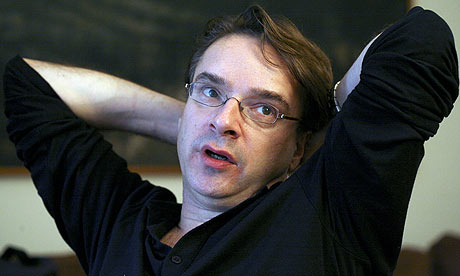 There is a self-destructiveness at the heart of man which is evidenced in both large ways and small, individual actions. Historians should be better than most in capturing this blackness at the heart of our existence, but for all that they are hardly immune from it themselves. I was, to be honest, gutted to hear of the extraordinary online and legal shenanigans of one of my favourite historians, Orlando Figes. Figes has managed to shed more light on the hidden world of communist Russia than most others writing today, and in a compelling, literary fashion that compels admiration. His unfolding of the Russian Revolution, in his book "A People's Tragedy" is as gripping as history can be, illuminated by extraordinarily detailed insights into the lives of all sorts of people who lived through those murderous times. Nearly any other history of that event seems, by comparison, rather grey and uninteresting, and often superficial. Then there's "The Whisperers", his chilling survey of the lives of Stalin's forgotten citizens - a masterpiece of historical research and, once again, an amazing read.
There is a self-destructiveness at the heart of man which is evidenced in both large ways and small, individual actions. Historians should be better than most in capturing this blackness at the heart of our existence, but for all that they are hardly immune from it themselves. I was, to be honest, gutted to hear of the extraordinary online and legal shenanigans of one of my favourite historians, Orlando Figes. Figes has managed to shed more light on the hidden world of communist Russia than most others writing today, and in a compelling, literary fashion that compels admiration. His unfolding of the Russian Revolution, in his book "A People's Tragedy" is as gripping as history can be, illuminated by extraordinarily detailed insights into the lives of all sorts of people who lived through those murderous times. Nearly any other history of that event seems, by comparison, rather grey and uninteresting, and often superficial. Then there's "The Whisperers", his chilling survey of the lives of Stalin's forgotten citizens - a masterpiece of historical research and, once again, an amazing read.So how utterly tragic to find that this brilliant man has also sown the seeds of his own destruction with some petty, vindictive reviews written anonymously on Amazon. And then compounded the error by using legal force to try and prevent anyone getting at the truth of their true authorship, then sheltering behind his wife's apparent willingness to take the fall for him before finally admitting to the truth today.
The story of Figes and the anonymous reviews is a bizarre one, although it sheds a light on the very competitive, often bitchy world of academia. Historians may write books for the general public, but their eye is firmly on the reactions of their fellow academics. The academic world has long been full of people of extraordinary intelligence capable of the most petty slights. There are few top academics who do not believe that theirs is the only true, honest and acceptable interpretation in their field of study, and everyone else is frankly a charlatan. It has always been thus. Figes' comments are not, in themselves, any more damning than the comments made on a regular basis by academics about each other. But their anonymity, and his dissimulation about their authorship, has elevated them into something much worse than the sum of their content.
In one of his anonymous Amazon reviews, Figes described fellow historian Robert Service's history of communism, "Comrades" as "awful" and "curiously dull". I have to say he is not far wrong in the latter comment. It is a masterly work (it is not "awful" by a long chalk) but there is no doubt that Service lacks Figes' own ability to add colour, dash and excitement to his narratives. Their lecturing styles are not dissimilar - Service is worthy but a little somnolent, while Figes is enthusiastic, engaging, and monumentally sure of himself. But Figes did not need to make any remark about Service's work at all. He outsells the Oxford professor considerably, so what on earth was he up to? This splat in academia has opened a wide window on the wasps' nest of academia, and the behaviour of Professor Figes in particular, with Robert Service (in a rather staccato, diary-like account) writing in the Observer today; another historian trashed by Figes, Rachel Polonsky, giving her account in the Mail on Sunday; and the Independent of Sunday reporting other examples of Figes' attitude to fellow historians, and his apparently liberal approach to quoting their writings!
Orlando Figes is on 'sick leave' from his berth at Birkbeck College. It's difficult to see how he can re-emerge as a credible figure from this dismal affair. How and why he went down this bizarre route is inexplicable. But for all this, fo r all the hammering his reputation now has for all time, his books remain brilliant, colourful renderings of extraordinary events. It's just a pity that he failed to draw the most personal lessons about the frailties of human behaviour.
r all the hammering his reputation now has for all time, his books remain brilliant, colourful renderings of extraordinary events. It's just a pity that he failed to draw the most personal lessons about the frailties of human behaviour.
 r all the hammering his reputation now has for all time, his books remain brilliant, colourful renderings of extraordinary events. It's just a pity that he failed to draw the most personal lessons about the frailties of human behaviour.
r all the hammering his reputation now has for all time, his books remain brilliant, colourful renderings of extraordinary events. It's just a pity that he failed to draw the most personal lessons about the frailties of human behaviour.

No comments:
Post a Comment